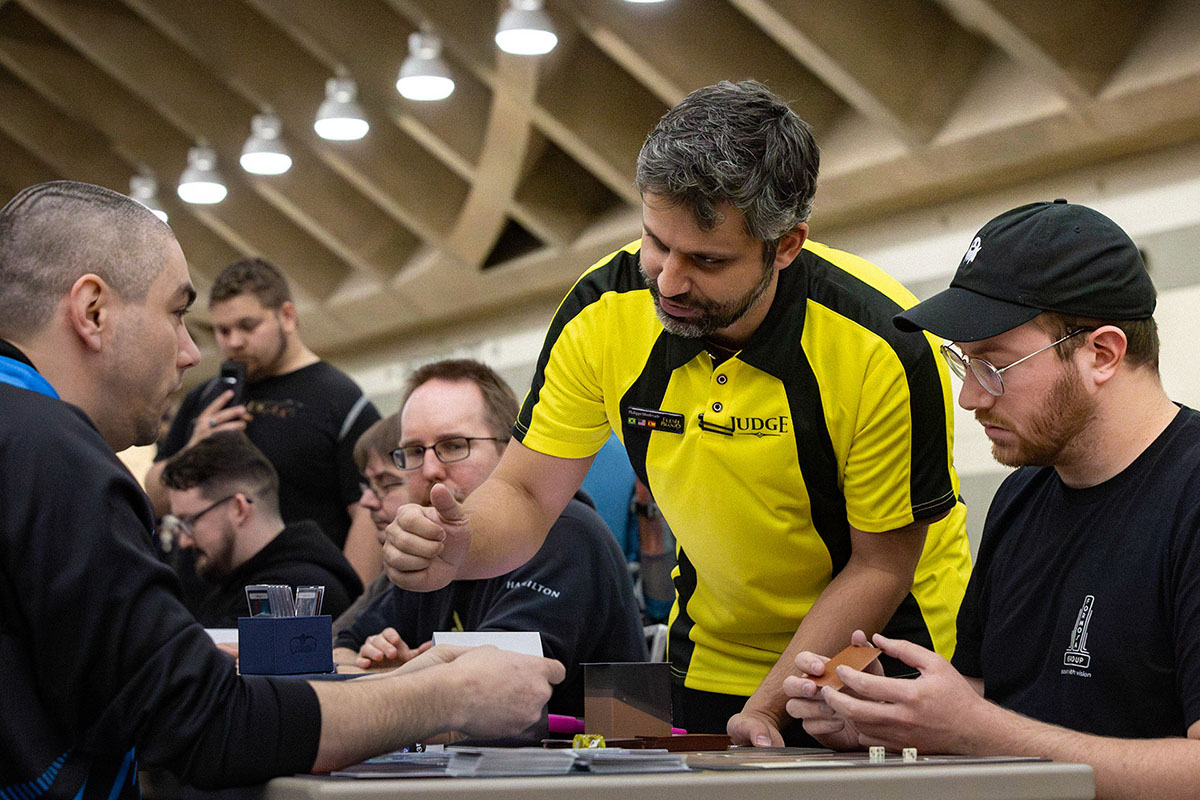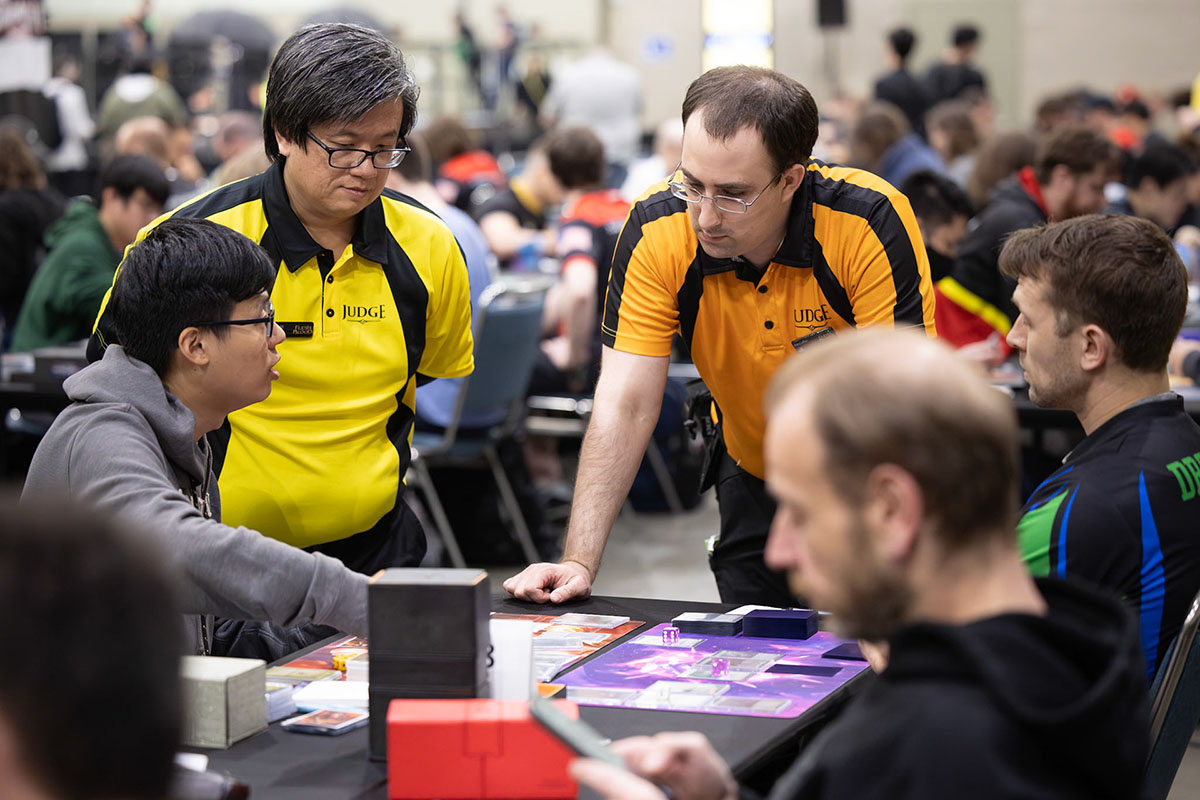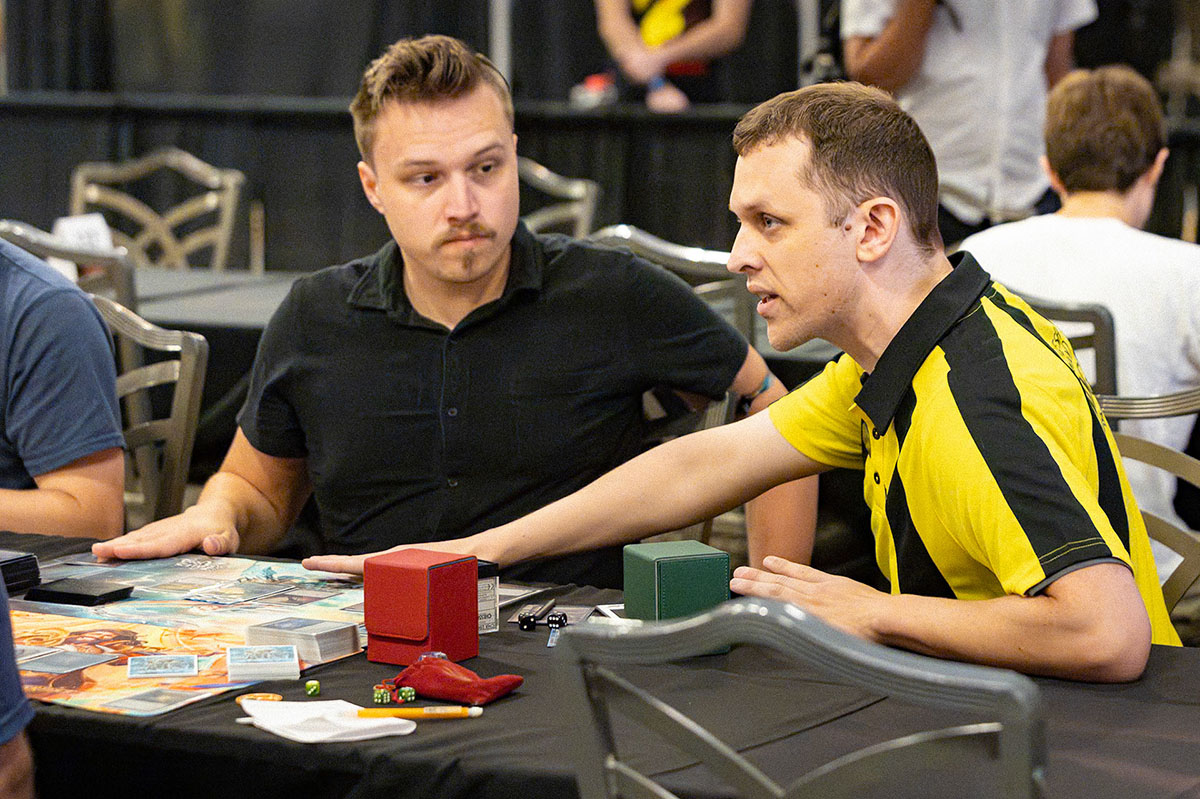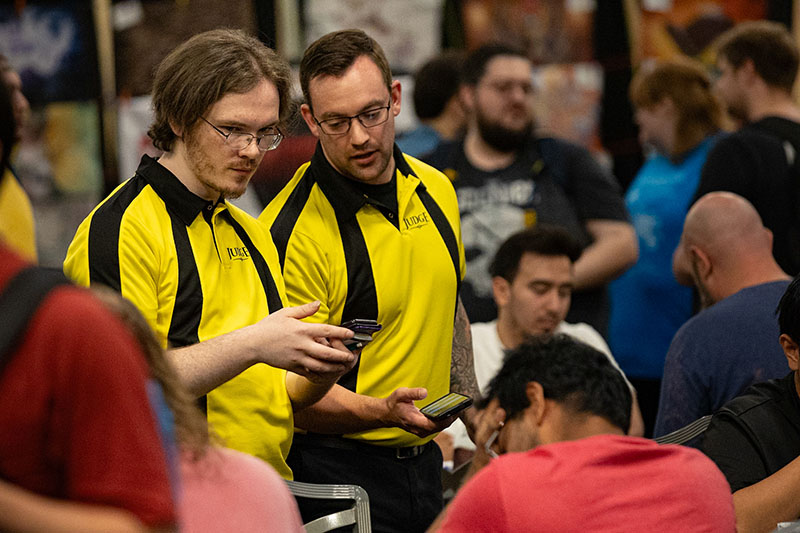
Taking a Judge Call
If you’re a new or aspiring Flesh and Blood judge, taking your first few judge calls can feel a bit intimidating. It’s natural to feel nervous, but don’t worry—this guide is designed to help you through the basics of handling a judge call, progressing into more advanced techniques to handle each situation effectively and professionally. Whether you are preparing to get certified or simply want to develop your judging skills, following these steps will ensure you’re on the right track to providing excellent service to the players and the community.
Step 1: Approach the Table
When a player calls for a judge, it’s important to approach the table confidently and calmly. You don’t need to rush over, but do make your way over as quickly as possible while catching the players’ attention. Go to the side of the table matching the player who called you.
As you arrive, take note of the time remaining in the round. This is a small but important detail, especially if the issue takes time to resolve, as you might need to add extra time later.
Once at the table, introduce yourself. A simple “Hi, I’m [Your Name], how can I help?” is perfect.
Step 2: Listen and Read Cards
Ask the players to explain the issue from their perspective. Try to listen to both sides without interrupting or taking sides. Always remain neutral.
Sometimes players might argue or talk over each other. If that happens, remind them that you’ll address the issue fairly but need each person to explain their side one at a time. One useful tool in case of disagreements is to separate the players, talking to each of them in turn at the table, while the other waits a few meters away.
While they’re explaining, read the cards involved. Flesh and Blood has detailed card text, and the exact wording of a card can make a big difference. If there’s a question about how a card works, read it carefully.
After listening, confirm the question. Summarize the situation back to the players: “Okay, so you’re saying that when you played this card, X happened, and your opponent believes Y should have happened. Is that correct?” This step helps clarify that you understand the issue.

Step 3: Investigate if a Rule was Broken
If the issue involves a potential rules infraction, you need to determine if the game state has been affected in any significant way.
Here’s a quick checklist for doing a basic investigation:
- Check life totals: Compare the life totals reported to what you see on the table. Are there discrepancies?
- Check card zones: Make sure cards are in the correct zones (pitch, graveyard, banished, hand, etc.). Misplaced cards can indicate a rules infraction or confusion, and you might notice that an important information was missing from the players story.
- Determine the impact: How has the mistake impacted the game? Was there an advantage gained or lost by either player? Does it change who wins, and at which turn?
- Evaluate the likelihood: Consider how likely the mistake could have been made innocently, especially in regard to how significant the impact is on the game.
If it’s a complex situation or involves significant impact (such as drawing extra cards, forgetting to resolve a trigger, or missing a key ability), take your time to ensure you fully understand what happened.
Step 4: Double Check Rules
If you’re not entirely sure about a ruling, double check the rules before making a call. Don’t be afraid to take a moment to consult the official rules documents (Comprehensive Rules, Policy and Penalty Guidelines, Casual Procedure Guide, Tournament Rules and Policies). You can also reach out to other judges at the event for assistance or check in on #live-calls on the Judges of RatheのDiscord for advice.
Remember: It’s better to take an extra minute to get the ruling right than to rush and make a mistake.

Step 5: Explain the Ruling, Fix the Issue
Once you’ve determined the correct ruling, explain it to the players before applying any fixes. Make sure both players understand the ruling and why you reached that decision.
Example: “Based on how the card is worded, [X] should have happened, so we’ll fix the game state by [specific action].”
If either player seems uncertain or unhappy with the ruling, and you’re not the Head Judge of this event, offer them the option to appeal. If another judge is available, they can handle the appeal. Never take it personally if a player asks for a second opinion—they’re just seeking confirmation of a fair decision.
If both players agree, perform the fix step by step. Make sure each action is carried out correctly, and that the game state is restored as close as possible to where it should have been.
To avoid providing outside assistance during a judge call, refrain from offering strategic advice or suggestions that could influence a player’s decision-making. Don’t mention a line of play a player didn’t bring up yet. Focus strictly on the rules and resolving the issue at hand. Always communicate clearly and neutrally to avoid steering players toward any particular play or outcome. If clarification is needed, stick to the facts without commenting on tactics.
Step 6: Wrap Up the Call
After the fix is applied, ask if the players have any further questions. Make sure they’re comfortable with the decision and understand what has happened.
If you’ve issued an IP2 penalty, stay at the table to ensure the penalty is properly handled. Players are often confused by how this penalty works.
Before leaving the table, give any extra time that was lost due to the judge call, rounding up. It’s a good practice to note how much time was spent on the call and then give the players that amount back. (Example: “You have three extra minutes added to your round.”)
Step 7: Report Penalties and Extra Time
Any penalties issued or extra time given must be recorded in the appropriate tool, such as Purplefox, notepads, or a sheet at the scorekeeper’s computer. This ensures proper tracking of penalties and prevents confusion later in the event.
If the penalty was a disqualification, make sure it’s properly reported.

Additional Tips
- Stay calm and composed: Your demeanor sets the tone for the call. Even if players are frustrated or upset, staying calm helps defuse the situation.
- Active listening: Show that you’re paying attention. Make eye contact, nod when appropriate, and don’t interrupt the players. Rephrase what they have said to show understanding. Ask for clarification.
- Avoid taking sides: Even if one player is clearly in the wrong, remain neutral in how you address both players.
- Learn from every call: Each judge call is an opportunity to improve your skills. Whether it’s ruling speed, card interactions, or communication techniques, reflect on what went well and what could be better.
Judging Flesh and Blood events is a challenging but rewarding experience. As you gain confidence and experience, you’ll handle calls more efficiently and provide a great player experience. By following the steps above, you’ll ensure that even the most complex situations are handled professionally and fairly. Happy judging!
All photos used in this article are courtesy of John Brian McCarthy, whose work you can find at Judges at Work.

